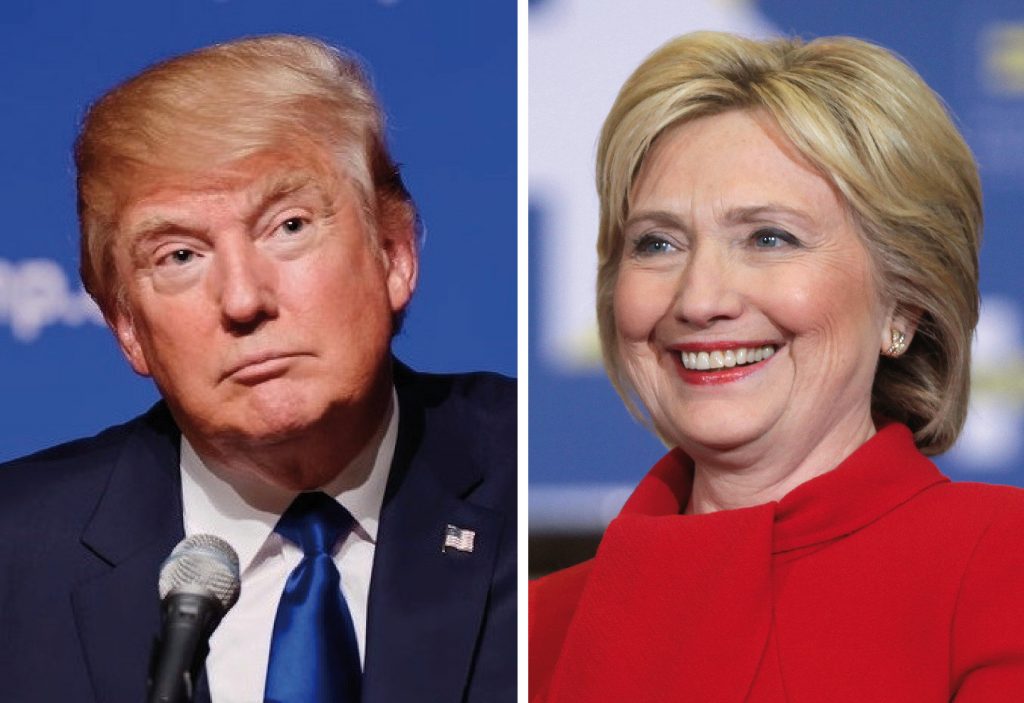Eisenhower Institute Fielding Fellows discuss what Trump, Clinton stand for

IMAGE CREDIT: GAGE SKIDMORE/BU ROB13/FURFUR/CC BY-SA 4.0
By Jeremy Porter, Contributing Writer
On Tuesday, Nov. 1, the Eisenhower Institute’s fellows of the Fielding Center for Presidential Leadership Study hosted a discussion entitled “Trump vs. Clinton: What do they really stand for?” The discussion was moderated by Fielding Fellows Taylor Beck ’17 and Rachel Haskins ’17 and featured commentary about the presidential candidates from three expert panelists: Carl Cannon, David Shribman, and Christopher Weyant ’89. Cannon is the Executive Editor and Washington Bureau Chief of RealClearPolitics. He was a fellow at Harvard University’s Institute of Politics and has covered every presidential campaign since 1984. Shribman is currently the executive editor of the Pittsburgh Post-Gazette and has served as the national political correspondent for The Wall Street Journal, and studied at Dartmouth College and Cambridge University in England. Weyant is a cartoonist for The New Yorker whose works have been published in hundreds of magazines and newspapers worldwide. A Gettysburg graduate with degrees in political science and economics, Weyant is a published children’s book illustrator and a Harvard Nieman Fellow.
The discussion was divided into two sections, broken up by a brief intermission during which a sample of Weyant’s cartoons was displayed on the projection screen. The first section consisted of discussion questions generated by the Fielding fellows. When asked if they thought that Clinton and Trump were catering to party lines rather than adhering to their own beliefs, the panelists agreed that it is difficult to determine what party lines are because of demographic changes in voting records (i.e. blue collar workers voting more Republican). They also explained how some of the biggest issues of this election have been about proper courtesy, language and behavior rather than concrete issues or plans, leaving many voters in the dark about Clinton’s and Trump’s actual political beliefs. Not since the days of the Monica Lewinsky scandal, the panelists said, has there been such a large emphasis on moral issues in a national election. Therefore, it is a tricky question to answer even for political experts. One of the biggest questions of the night was whether widespread distrust of Clinton and Trump is justifiable or exaggerated by political rhetoric. The panelists admitted that the distrust is largely justifiable and that the candidates’ actions have rightfully raised concern amongst voters. Regarding Trump, they explained how he has, on multiple occasions, been caught contradicting himself (i.e. falsely claiming he met Vladimir Putin; his confusingly varied stances on abortion in the past). They also explained how his involvement with controversial business ventures such as Trump University has added to voter distrust. The panelists then discussed how Clinton has her fair share of controversy, from the e-mail scandal to the Goldman Sachs speech (and suspected ties to Wall Street) to Huma Abedin and the Clinton Foundation, all of which have led some voters to lose faith in her and question her progressivism.
During the second half of the discussion, the panelists answered a few questions from audience members. When asked what the candidates must do in order to ameliorate the current political turmoil brought on by the election, they said, in essence, that the candidates must stick to their fundamental ideas and not get bogged down by the kind of controversy and questionable activity that has plagued the campaign season. Naturally, no matter who wins, a large portion of Americans will not agree with these views. However, the panelists agreed that national stability after such a wild election is essential. One student asked whether the recent resurgence in the FBI investigation of Clinton’s emails will have a significant effect on the election next week. Another question raised towards the end of the discussion was about neither Trump nor Clinton, but instead referred to third party candidates such as Gary Johnson and Jill Stein. A student asked the panelists if a third party “protest vote” is a waste of time. All three agreed that third party support has tanked in the past month (despite the fact that these candidates are generally more likeable than Clinton and Trump), and that “protest nominees” only take away votes from the Democratic or Republican candidate with whom they align politically.
The panelists expressed sympathy for college students because the candidates who will have a significant effect on students’ futures have run campaigns mired in scandal and controversy. One thing the panelists know is that our nation must not be crippled by this election season. Americans, and specifically the generation of budding professionals soon to enter the workforce, must remain optimistic and continue to fight for what they believe in.
Following the conclusion of the discussion, the EI Fielding fellows invited students to join them in the Junction at 8:00 p.m. on election night to watch live coverage of the results.
